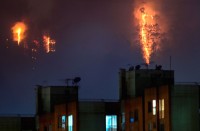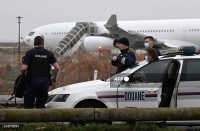
by Eva Rodriguez Lorenzo
Agence France-Presse
WASHINGTON, United States (AFP) — Over 200 detained members of Nicaragua’s opposition were freed Thursday and expelled to the United States, in a surprise move by the Central American country’s increasingly authoritarian president, Daniel Ortega.
After weeks of quiet talks with Washington, Nicaragua allowed the 222 detainees — which include former challengers to Ortega — to board a chartered flight to Washington.
US officials said they would allow the former prisoners to stay for at least two years and provide medical and legal support.
“I would like to thank God and everyone who made possible this miracle — the miracle of freedom,” Juan Sebastian Chamorro, who was arrested before he could challenge Ortega in the 2021 election, said at Dulles International Airport near the US capital.
“We are here in the land of freedom and we are very grateful,” he said.
Chamorro, whose aunt defeated Ortega in the 1990 presidential election, said that the group had no warning until they were given clothes and taken to another cell before being put on buses.
“It’s been 20 months behind bars in a maximum-security prison, totally incommunicado,” he said. “But here we are with our heads high.”
Ortega’s only comment on the move was to say that Catholic Bishop Rolando Alvarez, who was among the detainees, refused to join the others on the US-bound plane.
“Alvarez did not want to comply with the law, with what the state of Nicaragua mandates,” Ortega said, adding that the bishop returned to prison.
Octavio Rothschuh, president of an appeals court in the capital Managua, described the prisoners as having been “deported” and called them “traitors to the homeland.”
Nicaragua’s legislature moved to strip the expelled dissidents of their citizenship. To become law, the proposal must be voted on again in the second half of 2023.
Felix Maradiaga, another opposition figure arrested before the election, said he was asked to sign a one-line note that he was leaving the country voluntarily and that he was not told he could lose citizenship.
“We had absolutely no information on what would happen,” he said. “I will be Nicaraguan until the day I die.”
Maradiaga said the group sang Nicaragua’s national anthem on the plane.
Ariana Gutierrez Pinto, waiting at the airport for her mother Evelyn Pinto, a human rights activist who had been detained since November 2021, said she felt “hopeful.”
“To me their release is just because they will no longer live in misery, but it is also unjust because they are being expelled from their country,” she said.
After landing, the exiled dissidents were taken to local hotels.
– ‘Constructive step’ –
The United States welcomed their release but said it was made unilaterally without any promises in return for Ortega, who is under a slew of US sanctions.
The prisoners’ release “marks a constructive step towards addressing human rights abuses in the country and opens the door to further dialogue between the United States and Nicaragua regarding issues of concern,” Secretary of State Antony Blinken said in a statement.
State Department spokesman Ned Price said everyone in the group consented to travel to the United States, with two people choosing to stay in Nicaragua.
“This was not part of a broader deal with the government of Nicaragua,” Price told reporters.
“We would like to have a better relationship with Nicaragua. That ultimately is up to the government of Nicaragua,” he said.
One of those released is a dual US-Nicaraguan citizen, Michael Healy, a former leader of the nation’s leading business and industry council.
Javier Alvarez, a Nicaraguan living in exile in Costa Rica, said that his wife and daughter, who also have French nationality, were among those liberated.
– Growing clampdown –
Hundreds of people were sent to prison in Nicaragua in the wake of anti-government protests in 2018 that were met with a brutal crackdown resulting in 355 deaths and more than 100,000 people fleeing into exile.
Dozens of opposition figures were arrested in 2021 — including seven presidential hopefuls — ahead of elections. They were accused of undermining “national integrity.”
A firebrand Marxist in his youth, Ortega was a guerrilla in the Sandinista movement that initially took power in 1979 after toppling the US-backed Somoza family dictatorship.
The United States supported armed resistance to Ortega and the Sandinista rulers, in one of the most controversial interventions in the last decade of the Cold War.
Defeated in 1990, Ortega returned to power in 2007, and has since engaged in increasingly authoritarian practices, quashing presidential term limits and seizing control of all branches of the state.
The United States has imposed a series of sanctions on human rights grounds on Ortega as well as Vice President Rosario Murillo, who is his wife.
© Agence France-Presse







